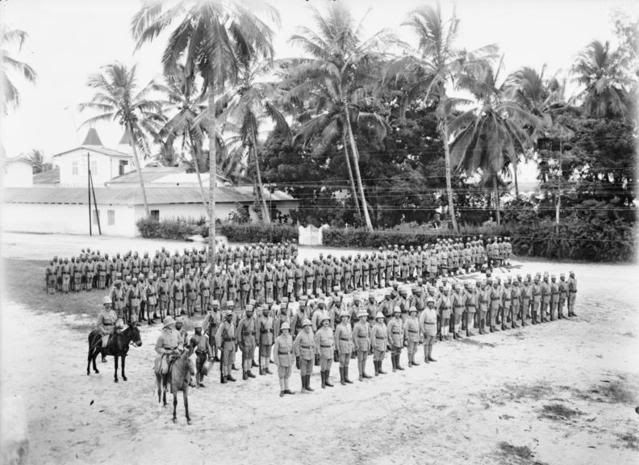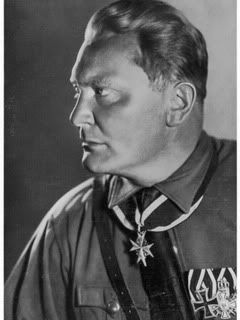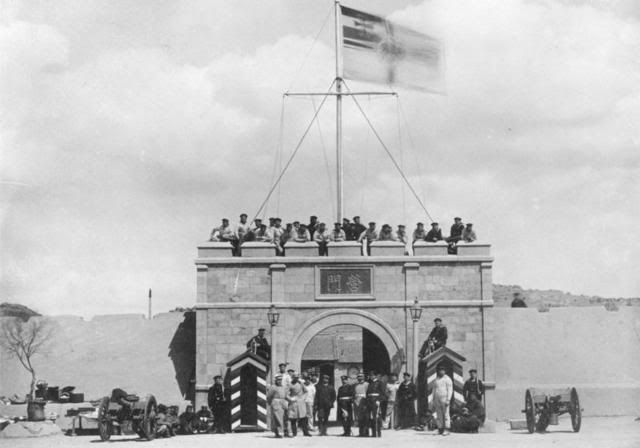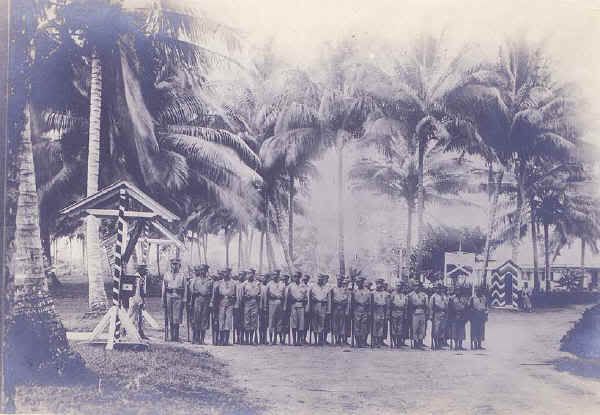A short history of the German Empire
- Thread starter unmerged(169228)
- Start date
-
We have updated our Community Code of Conduct. Please read through the new rules for the forum that are an integral part of Paradox Interactive’s User Agreement.
You are using an out of date browser. It may not display this or other websites correctly.
You should upgrade or use an alternative browser.
You should upgrade or use an alternative browser.
Why kill the future Führer?
Germany has a Kaiser. Do not need a Führer.
Because of the extended Great War, there's kind of good news and bad news for Hitler in Kaiserreich. Good: He finally gets that promotion to Unteroffizier. Bad: He dies in Russia. There was one KR AAR once upon a time that used both KR and Kim Newman's Anno Dracula series where Hitler continues fighting for the vampire Kaiser as a zombie well into the 1940s.
Why kill the future Führer?
Because
A) The KR canon says so.
and
B) Because killing Hitler is a well established tradition of this forum.
Things are looking OK for Austria-Hungary. Are they more fragile than they look?
I can't hear this without picturing a version of Kenny's repeated death in South Park.
B) Because killing Hitler is a well established tradition of this forum.
I can't hear this without picturing a version of Kenny's repeated death in South Park.
I can't hear this without picturing a version of Kenny's repeated death in South Park.
True. Adolf is the Kenny of Paradox.
It looks like the German establishment's still trying to avoid deciding on a course for the future and pretend that the good times will last forever to some extent- the army's still in flux and now we've got a brewing fight over the air force.
Who's winning in Russia at the moment? A Soviet victory is obviously not in Germany's interests but at the same time there isn't going to be much enthusiasm to get entangled with the failed state that is Russia, particularly while the military's still being reorganised.There'll probably be voices calling for increased arms exports to the Russian government though- it should be useful to have the Russian government owe Germany for propping it up once again and it would be a nice little boost to the German arms industry if nothing else.
Who's winning in Russia at the moment? A Soviet victory is obviously not in Germany's interests but at the same time there isn't going to be much enthusiasm to get entangled with the failed state that is Russia, particularly while the military's still being reorganised.There'll probably be voices calling for increased arms exports to the Russian government though- it should be useful to have the Russian government owe Germany for propping it up once again and it would be a nice little boost to the German arms industry if nothing else.
Because
A) The KR canon says so.
and
B) Because killing Hitler is a well established tradition of this forum.
We both know that Hitler is the leader of the Totalist wing of the FAUD.
@ c0d5579: The Austrians have played the game in Italy very well, leveraging two very powerful Habsburg nobles (Grand Duke Jozef von Österreich-Toskane and Duke Robert von Habsburg-Este) and moderates like Amedeo d'Aosta against the potential threat of a Pope with a spine wanting to become more than a very symbolic leader. The popes influence (already weak and waning) is now broken completely. Still, the Austrians have more pressing issues than keeping a bufferstate stable. The renegotiations for the Ausgleich are up and Slavs and Magyars alike are demanding reforms Vienna is not willing to give them
We'll be seeing more of the Wilhelms in the next update, which will feature an overview of the Hohenzollerns and their current activities. Suffice to say that Schleicher is a good friend of the Crown Prince, as is Generaloberst Von Bock.
And last but not least, the issues of Shakoes for tank crew. I think most of the tankers are quite happy Beck has decided those antiques have no place in modern warfare .
.
@ Enewald, c0d5579, Yourworstnightm, Kurt_Steiner, Alfredian, Viden: I followed Kaiserreich canon when dealing with everyones least favourite Austrian. Still, Hitler became Unteroffizier and is seen as a national hero and author for generations to come.
@ Alfredian: the Austrians face serious issues with Hungary over the Slavic question. The Austrians have granted Poles and Bohemians more and more freedom in every Ausgleich, much to Hungaries chagri, as they where forced to do the same with Croatia. The Hungarians demand stronger repression, while the Poles, Czechs, Croats and Bosniaks want a status equal to Hungary at the least.
@ Zhuge Liang: German society is deeply conservative, with a mindset to match. Any attempt at reform is seen as an assault on the institutions and values that have won the Weltkrieg and gained Germany an Empire. Reform will either be slow and steady, or born from extreme neccesity.
In case of the Russo-Soviet War, the current ingame stalemate is to Germanies benefit. The Soviets are contained, while the Russians have their hands tied (and out of Germanies way). Romanov and the aristocrats forming his government have no love lost for arrogant Germany, while the Kaisers government knows of their covert support to the Lithuanians. Still, having a Red government on both borders would be a strategical nightmare, with Germany probably getting serious in its aid after the Russians have bled a bit more. Remember, Germany invented Realpolitik...
We'll be seeing more of the Wilhelms in the next update, which will feature an overview of the Hohenzollerns and their current activities. Suffice to say that Schleicher is a good friend of the Crown Prince, as is Generaloberst Von Bock.
And last but not least, the issues of Shakoes for tank crew. I think most of the tankers are quite happy Beck has decided those antiques have no place in modern warfare
@ Enewald, c0d5579, Yourworstnightm, Kurt_Steiner, Alfredian, Viden: I followed Kaiserreich canon when dealing with everyones least favourite Austrian. Still, Hitler became Unteroffizier and is seen as a national hero and author for generations to come.
@ Alfredian: the Austrians face serious issues with Hungary over the Slavic question. The Austrians have granted Poles and Bohemians more and more freedom in every Ausgleich, much to Hungaries chagri, as they where forced to do the same with Croatia. The Hungarians demand stronger repression, while the Poles, Czechs, Croats and Bosniaks want a status equal to Hungary at the least.
@ Zhuge Liang: German society is deeply conservative, with a mindset to match. Any attempt at reform is seen as an assault on the institutions and values that have won the Weltkrieg and gained Germany an Empire. Reform will either be slow and steady, or born from extreme neccesity.
In case of the Russo-Soviet War, the current ingame stalemate is to Germanies benefit. The Soviets are contained, while the Russians have their hands tied (and out of Germanies way). Romanov and the aristocrats forming his government have no love lost for arrogant Germany, while the Kaisers government knows of their covert support to the Lithuanians. Still, having a Red government on both borders would be a strategical nightmare, with Germany probably getting serious in its aid after the Russians have bled a bit more. Remember, Germany invented Realpolitik...
The Ausgleich usually means all parts of Austria- Hungary pulling in their own direction. Austria want to return to Centralism, Hungary want to keep Dualism, while Bohemia, Croatia etc. want to further federalism. Usually it can't be solved peacefully.
Personally, given the Austrians' (and ONLY Austrians', since none of the other member-states of the Empire really benefited) recent success in Italy, I wouldn't be surprised if Otto's government was willing to try a more daring example in the Ausgleich negotiations.
Now, back to the shako problem... I remember the soft cap-beret changeover, and having had to maintain both soft cap and beret, I can safely tell you that whatever your average soldier thinks about silly headgear choices is totally ignored at higher levels. Never had to shave a soft cap. I mean, really, who the hell decided hats you had to shave were a good idea???
Now, back to the shako problem... I remember the soft cap-beret changeover, and having had to maintain both soft cap and beret, I can safely tell you that whatever your average soldier thinks about silly headgear choices is totally ignored at higher levels. Never had to shave a soft cap. I mean, really, who the hell decided hats you had to shave were a good idea???
@ Yourworstn: I don't think anyone is surprised when I tell the Ausgleich will go horribly wrong and leads to the chaos we all know and love.
@ c0d5579: Luckily for most German soldiers, only the Guards have to maintain a Pickelhaube in combination with more practical headgear.
I hope to give you all a new update as soon as possible, but travelling back and forth to my new job takes more time than I had thought, leaving me with less time to update my AARs.
@ c0d5579: Luckily for most German soldiers, only the Guards have to maintain a Pickelhaube in combination with more practical headgear.
I hope to give you all a new update as soon as possible, but travelling back and forth to my new job takes more time than I had thought, leaving me with less time to update my AARs.
Thread is still alive, just biding its time for a glorious return. With a bit of luck I can give a small update friday or saturday. It can either deal with the status of the German colonial Empire, or give some more insight in the upcoming elections of 1937. Take your pick...
Both would be nice. But if we have to take a pick I'd go for an update on the colonies 
The German colonial Empire
Before the Weltkrieg, the German Empire was just a collection of leftover pieces of Africa and a large number of practically useless Pacific islands. The victory during the Weltkrieg changed Germany from a minor colonial power into the single true Great Power left in the world. The war won Germany the Belgian Congo, together with most of Frances sub-Saharan colonies in Africa, as well as its Asian and Pacific possesions. After the British Revolution the Kaiserliche Marine managed to secure many of Britains strategically placed colonies, while the colonial troops in Africa restored control in Britains African colonies, which where in the throes of revolt themselves.
Today Germany is often seen as the last of the great European Empires, with only lesser powers as Portugal and the Netherlands still in possession of a sizable colonial Empire. National France can be considered a colonial Empire in exile, although the French argue Algeria is part of Metropolitan France.
The Naval colonies
Currently Germany is the only nation controlling extensive parts of territory around the world. Unfortunately this means the Kaiserliche Marine has to guard more sealanes than any other navy in existence, having to police three oceans by itself. As such, as early as 1921, the naval high command had started plans for setting up naval bases in strategic possessions.
For this reason a 50-year lease of Crete to Germany was one of the more humiliating parts of the peace between Greece and Germany. The harbour of Heraclion saw some limited expansion, although the collapse of Britain, and the acquisition of traditional strongpoints as Malta and Suez obsoleted the harbour even before its completion. Suez became the base of operations for the German Mittelmeerflotte, with its commander being in nominal command of all Mediterranean holdings. These days both Malta and Suez are governed by a military government, although the people of Malta have the right to elect a consulting assembly, while Crete has been turned into a protectorate, with a civil governor administrating a basically self governing island.
This system was expanded across the Red Sea and Indian Ocean, with Germanies possesions around the Red Sea and in the Indian ocean being controlled from Colombo station on Ceylon.
Aden and Djibouti in German Somaliland becoming secondary ports of operation, with a civil administration governing the rest of Ceylon, Somaliland and the isles in the Indian Ocean.
The Mittelafrikan experiment
The Freistaat Mittelafrika knew two fathers: Colonial secretary Wilhelm Solf and war hero Paul Emil von Lettow-Vorbeck. It was Solf that knew the massive acquisitions in Africa would surely lead to Imperial overstretch and envisioned a solution according to the model of British India even before the addition of the British colonies to the Freistaat. He envisioned a decentralized state with colonial officials and native princes working together. Yet it was Lettow-Vorbeck that allowed Solfs dream to come true. Lettow-Vorbeck possessed a unique combination of charisma and toughness that allowed him to either charm or bully the many tribal elders and local chiefs, as well as French, British or Belgian colonials into accepting a balance of power favouring Germany.

The famed Askari holding a drill in Dar-es-Salaam
After a highly succesfull tenure as Statthalter, Lettow-Vorbeck followed Solf into retirement, although the restless Lettow-Vorbeck soon joined the NLP faction in the Reichstag to combat the populist Alldeutscher Verband. Ironically Lettow-Vorbecks successor was a man often suspected of AV sympathies, the Bavarian General der Flieger Hermann Göring. Goering was appointed by Papen, allegedly after donating a sizable sum of his vast personal wealth to the DNP-treasury. Still, the charming former ace proved to be as effective, if more brutal, in governing the Freistaat. Still, many whisper the Statthalters ambitions stretch further than Dar-es-Salaam.

Statthalter (viceroy) and Generaloberst Hermann Wilhelm Göring. A Weltkrieg fighter ace who married into wealth. The combination of being a warhero, charming, very wealthy and family of former colonial administrators made him both the second Statthalter of Mittelafrika and the golden boy of many staunch nationalists.
Besides the Freistaat, the German Empire owns two protectorates on the dark continent in the form of Madagascar and Morocco. Madagascar was too important to be allowed to fall to native revolution, yet not significant enough to warrant extensive colonisation. As such the native monarchy was restored, but had to swear loyalty to the Emperor. The removal of Morocco from the French sphere of influence was a direct wish of Wilhelm II himself, to avenge his humiliation during the Agadir-crisis. Neither Sultan Mohammed V or Spain where in a position to argue when Germany replaced France in the dual protectorate over the sultanate.
China, South-East Asia and the Pacific
Before the Weltkrieg, Germany only held the city of Tsingtau, a port dominated by the interests of the Germania brewery. It fell to the Japanese Imperial Army during the Weltkrieg after a short but bloody fight, but was reluctantly returned to Germany after the war. It was from this port that German forces launched their march on Beijing in 1926, in support of the Xu Shichang-government. As a prize the Chinese government had to secede the rest of the Qingdao-peninsula and Hainan island to Germany, as well as lending Germany economic control the provinces of Guanxi, Guandong, Hunan, Jianxi, Fujian and Zhejian. The Qingdao-peninsula, and Tsingtau in particular, are vital holdings in Germanies grip on Asia, being a dagger pointed at both Beijing and the Japanese homelands (although the same is true). The vast economic concessions gained in the southern company where delegated to a newly created company: the Allgemeiner OstAsiatische Gemeinschaft, a joined venture between many of Germanies most respected companies. The Empire itself appointed the Governor-General, currently Generaloberst Alexander von Falkenhausen overseeing the German forces and Imperial interests in the region in exchange for a significant investment in the AOG.

The main gate of Tsingtau. more than 50 years of German rule have turned the city into a mix between Hamburg and the Orient.
Besides China, Germany has significant possesions in South-East Asia. Most of the French colony of Indochina was secured with the aid of Siam after the Weltkrieg, with Siam gaining rule over Cambodia in exchange for not aiding any native Vietnamese in their struggle for independence. Yet German rule over Indochina is shallow at best, with most lower and midlevel colonial posts still being filled by French colonials, with Germany not willing to waste too many of its few able administrators on Indochina. Siam aided the Empire once again after the fall of Britain, gaining most of Malaya, as Germany was only interested in the Strait Colonies for obvious strategic reasons. The control of Singapore, and its large military port, was a great boon for Germany, but has also led to a vitriolic struggle between the naval commanders of Tsingtau and Singapore over which of the two should become the lead port in the region. The British colonies and protectorates of Sabah, Brunei and Sarawak where turned into the colony of Deutsch Borneo and soon turned into a prime source of oil for the Empire.

A squad of Papuan Schützen holding a drill. Usually troops like these where only used for maintaining control over a colony, not actual combat. The only exception to this where the famed Mittelafrikan Askari or the Chinese 'Konstabler' employed by the AOG.
Despite being among its oldest possesions, the German Pacific colonies are little more than a footnote in a list of said colonies, mostly just used as a first posting for would-be administrators or a place of banishment for disgraced officers or administrators. Traditionally the large collection of islands was ruled from Rabaul in German New Guinea, with the protectorate of Samoa forming a separate colony. After the Weltkrieg, New Caledonia and Tahiti where added to the colony. A recent problem has been the influx of Japanese immigrants in the Marianas, with Saipan in particular being dominated by immigrants. German governors have delayed any of Berlins bans on immigration out of fear of rebellion, or worse, Japanese intervention. With Japan building its forces, conflict seems imminent.
###############
Not a fullblown update, but something to keep you all busy while I write a real update about Seeckts succession and the upcoming elections, while the crisis on the Danube keeps on brewing.
I'd like to see states like AOG or Mittelafrika in real life. A German state outside Europe. 
How scary would that be. German beer everywhere.
How scary would that be. German beer everywhere.
Crete should be turned into an air base to protect the Channel.
Am I the only one who thinks that Tsingtao is as useful for Germany as a fireplace in the Sahara?
Am I the only one who thinks that Tsingtao is as useful for Germany as a fireplace in the Sahara?
I'd like to see states like AOG or Mittelafrika in real life. A German state outside Europe.
How scary would that be. German beer everywhere.
Actually... http://www.tsingtaobeer.com/brewery/brewery.htm

